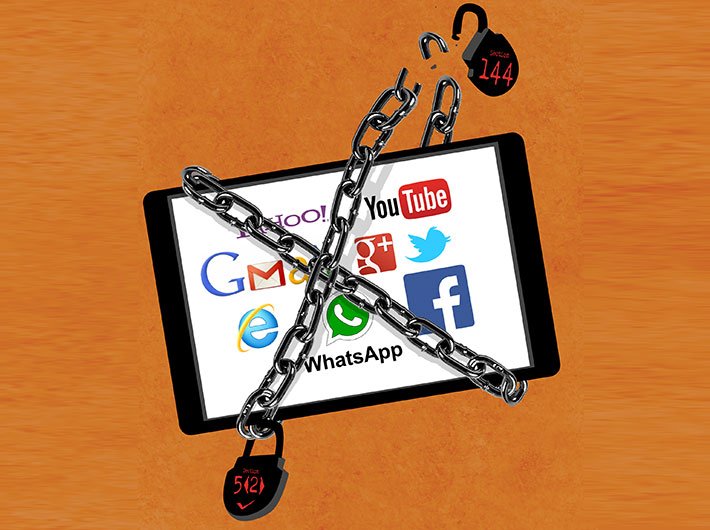The provisions under the Telegraph Act are wispy and can’t be convincingly invoked to exercise a jurisdiction on the internet world
The Haryana government on February 19 suspended mobile internet services in the districts affected by the agitation caused by the Jat community over reservation. The ban was imposed under section 144 of criminal procedure code (CrPC) to control the situation from being fanned by rumours or inflammatory messages.Similar ban was imposed in Gujarat last year during violent protests stirred by Hardik Patel over reservation of Patel community. In a similar manner internet connectivity was snapped in Nagaland, Rajasthan and Jammu and Kashmir last year under section 144 in order to contain law and order situation.
The CrPC section allows an official authorised by the state government to “direct any person to abstain from a certain act or to take certain order” which is “likely to prevent, or tends to prevent, obstruction, annoyance or injury to any person lawfully employed,or danger to human life, health or safety, or a disturbance of the public tranquility, or a riot, of an affray”. “An order under this section may, in cases of emergency or in cases where the circumstances do not admit of the serving in due time of a notice upon the person against whom the order is directed, be passed ex parte,” the section states.
However, the civil rights lawyers claim that section 144 is a general law. “Section 144 is a means to curb apprehended danger and nuisance in emergencies, but its use to ban internet access for a region is an excessive and arbitrary use of powers granted to the state government under this provision,” says Mishi Choudhary, legal director, software freedom law centre (SFLC).
They, moreover, believe that the above section is not specific and contextual in cases of communication ban. So what is the correct law that comes in disposal of state authorities during emergencies that call for an urgent step? It’s section 5 of the Indian Telegraph Act, 1885. The act specifically deals with blocking web domains or web pages or blanket ban. Section 5(2) says that states or central government can prevent transmission of any message(s) that cause incitement to unlawful situation. Looking carefully, this section focuses only on blocking of inflammatory message(s), not a blanket ban.
In the case of Gujarat, for example, Hardik Patel, leading the agitation, used WhatsApp to spread the word for Bharat bandh, which consequently caused a blanket ban on data services by the state authorities. Under section 5(2), the authorities could have gone ahead only with banning social media websites and messaging application, instead of a blanket ban.
Section 5(2) of the telegraph Act also allows the authorities to lawfully intercept messages during public emergency. The central government has laid out clear guidelines in 2014, defining circumstances that demands phone tapping and in what manner. Similar guidelines are not there for suspending internet services under same law, however.
“The way in which the ban is imposed is unreasonable. Problem is in the method that is being used in absence of guidelines, defining circumstances under which they can impose a restriction on internet sites,” says Arun Kumar, head of cyber initiatives at Observer Research Foundation (ORF).
If government formulates these rules or guidelines it will set a threshold for state or central authorities, which will define the urgency of imposing ban on internet services. It will also make authorities answerable, limiting the misuse of power under the section 144 of the CrPC.
The civil rights lawyers cite example of section 69 A of the IT Act, 2000, which grants power to the central government to direct notice to intermediaries (for example, Facebook and Twitter), to block public access to any information that could stir violence in the country. In this case the government formulated blocking rules in 2009, providing for examination of complaints. The authority to employ this power however lies with the central government, and so, a state not using this law for taking down any message or domain from public view is understandable, during riot-like situation.
For states to legitimately use their power, it is essential to have similar blocking rules for section 5(2) of telegraph act.
Is blanket ban needed, anyway?
“Blocking all internet access is clearly an unnecessary and disproportionate measure that cannot be countenanced as a ‘reasonable restriction’ on freedom of expression and the right to seek and receive information, which is an integral part of the freedom of expression,” says Pranesh Prakash, policy director, Centre for Internet and Society (CIS).
For instance, he adds, a riot-affected woman seeking to find out the address of the nearest hospital cannot do so on her phone. “Instead of blocking access to the internet, the government should seek to quell rumours by using social networks to spread the truth, and by using social networks to warn potential rioters of the consequences,” he says.
Former Mumbai police commissioner Rakesh Maria used WhatsApp to counter rumours spread after circulation of a fake photo in January 2015. A similar approach could have been taken by state authorities in the case of Gujarat or Haryana; countering miscreants, informing public about the truth and emergency help details.
“Instead of doing that, we saw that in Gujarat, the police themselves engaged in acts of violent vandalism (caught on CCTV cameras), and in Manipur the police shot dead nine Manipuri tribals, including a 11-year-old child,” retorts Pranesh.
Blocking internet should be used as a last resort, and taking a balanced approach that considers interest of every stakeholder in a society is essential, argue civil rights lawyers. It is also imperative on the part of the government to formulate guidelines or a rule book to tackle the arbitrariness exercised by the states and security forces.

